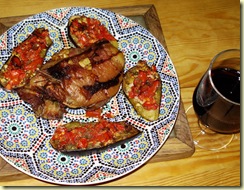>
There are serious food issues affecting developing countries and many parts of the world where people do not have enough to eat. According to the United Nations one-sixth of humanity is undernourished. In the developed world the issues are more to do with over-consumption and waste of the earth’s resources. Sometimes it seems as though there is little that an individual can do. But I think that growing as much as we can of our own food and buying food that is locally produced are important small steps that each of us can make, to conserve the earth’s limited resources and to minimise exploitation of people in the developing world. You can find out more about World Food Day here.
Big commerce is bad for food. This is my 201st post on this blog and, on World Food Day, I would like to make it a celebration of local food. In our village we’re lucky to have a weekly market, an excellent épicerie (grocer’s shop), a small supermarket, a boulangerie (baker’s shop) and visiting vans which sell meat and shellfish.
 The charcuterie stall at the Wednesday market. The charcuterie stall at the Wednesday market. |
 The butcher’s van on Friday morning. |
 The boulangerie – bakery. |
 The épicerie – grocer’s shop, full of good food and friendly advice. |
We, and anyone else who lives here, can buy all we need in the village. It is excellent quality, good value and much of it is produced locally. We find we need go to supermarkets only to buy toiletries and Italian coffee. In Roujan, a larger village 2 km away, there are two excellent butchers who sell an enormous range of good meat and, best of all, will advise on how to cook it, as well as other friendly small shops.
But the small shops in Roujan, and maybe Gabian too, are threatened by the construction of a supermarket there.
 |
 |
 |
This is the site of the planned supermarket where, as in Gabian, more plane trees have been felled to make another new roundabout at its entrance.
This is bad news for food. In the UK it has been shown that when a supermarket is built on the outskirts of a town it sucks the lifeblood from the centre. The food sold in supermarkets is mass-produced and generally of lower quality than that in small shops. It is transported long distances, wasting resources and causing pollution. Because of their centralised distribution systems supermarkets cannot support local food as well as small shops can. And the profits made leave the area, feeding big business rather than being ploughed back into the locality.
And local wine …
This evening we went to a tasting to celebrate the arrival of the primeur wine at the Cave Co-operative at Neffiès. The vin primeur is the first of the year’s wine to be ready to drink, a light wine which takes only three weeks or so to make. It’s a good reason for a party and the tasting at Neffiès was fun, with roasted chestnuts (another seasonal local product) to eat with the wine, and live music. The cave at Neffiès has recently amalgamated with the one at nearby Alignan-du-vent (a sign of the times and the economic crisis in wine-making), but we were pleased to hear that some of the high-quality wines from Neffiès such as their Cathérine de Juery will continue to be made.
 Hot roasted chestnuts to accompany the new wine. |
 Tuning up for the music and wine tasting. |
And home to a local supper
We came home from Neffiès to a supper of roast saddle of lamb, bought in one of the butcher’s shops in Roujan, and aubergines stuffed with tomatoes, both grown in our garden. A delicious local supper! We marinaded the saddle of lamb with rosemary, garlic and lemon juice for a few hours, then roasted it, adding a glass of white wine to the roasting dish, until it was just done and still a bit pink inside. We served it with halved aubergines topped with chopped tomatoes, garlic, thyme and olive oil and baked in the oven.
Bilingual blog / le blog bilingue
Over the next few weeks I shall not have time to write my blog posts in French as well as English. I’ll resume the French version as soon as possible, but in the meantime I apologise for not being able to produce a bilingual blog.
Pendant les semaines qui viennent je n’aurai pas le temps pour écrire les articles sur ce blog en français. Je reprendrai la version française aussitôt que possible, mais pour le moment je m’excuse de ne pas produire un blog bilingue.























